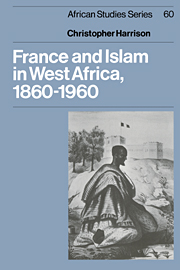Book contents
- Frontmatter
- Contents
- Acknowledgements
- Abbreviations
- Map
- 1 Introduction
- PART I 1850–1898: NINETEENTH-CENTURY ORIGINS OF FRENCH ISLAMIC POLICY
- PART II 1898–1912: THE FEAR OF ISLAM
- PART III FRENCH SCHOLARSHIP AND THE DEFINITION OF ISLAM NOIR
- PART IV 1920–1940: THE FRENCH STAKE IN ISLAM NOIR
- Introduction
- 8 Post-war attitudes to Islam
- 9 The French stake in Islam
- 10 The ‘rediscovery’ of Islam
- 11 Epilogue 1940–1960
- 12 Conclusion
- Notes
- Bibliography
- Index
12 - Conclusion
Published online by Cambridge University Press: 01 February 2010
- Frontmatter
- Contents
- Acknowledgements
- Abbreviations
- Map
- 1 Introduction
- PART I 1850–1898: NINETEENTH-CENTURY ORIGINS OF FRENCH ISLAMIC POLICY
- PART II 1898–1912: THE FEAR OF ISLAM
- PART III FRENCH SCHOLARSHIP AND THE DEFINITION OF ISLAM NOIR
- PART IV 1920–1940: THE FRENCH STAKE IN ISLAM NOIR
- Introduction
- 8 Post-war attitudes to Islam
- 9 The French stake in Islam
- 10 The ‘rediscovery’ of Islam
- 11 Epilogue 1940–1960
- 12 Conclusion
- Notes
- Bibliography
- Index
Summary
The combined processes of the gathering and utilisation of information about the communities of Africa has been a neglected aspect of colonial rule which deserves further study. In focussing specifically on French attitudes and policies towards Islam in West Africa, I have described the evolution of a particular view of Islam which itself was part and parcel of a wider view of African society generally.
I have argued that the various experiences of the nineteenth century, both in West Africa and also in Algeria, formed the prelude to the emergence of a distinctive perception of and policy towards Islam. These experiences combined to produce a somewhat contradictory picture of Islam: the fiercest adversaries of French military imperialism had been Muslim leaders, but it was with an army comprising large numbers of Muslim soldiers that the forces of al-Hajj Umar and Samori Ture had eventually been defeated; Mgr. Lavigerie emphasised the relationship between slavery and Islam, yet Louis-Gustave Binger doubted that the unemployed of metropolitan France were as well treated as the house slaves of African Muslims; and, finally, the scholars in Algeria had warned of well-organised secret Islamic brotherhoods but, south of the Sahara, Le Chatelier, one of France's foremost experts on Islam, argued that such organisations were the product of French imagination. What then in French eyes were the essential features of African Islam? At the turn of the century you paid your money and took your choice.
- Type
- Chapter
- Information
- France and Islam in West Africa, 1860–1960 , pp. 202 - 204Publisher: Cambridge University PressPrint publication year: 1988



